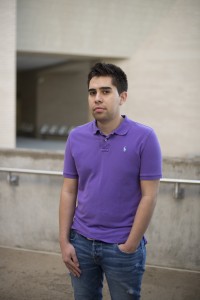By Lariza Moreno/reporter
Students who are U.S. citizens can’t imagine working hard in school, having a perfect GPA and being denied a full-ride scholarship.
But that happened to Daniel Cruz and Candy Castaneda.
And Gerardo Montes said he would be working as a construction worker if it weren’t for a new opportunity.

Photo by Lariza Moreno/The Collegian
These students were granted the opportunity to pursue the American dream through a new policy aimed at undocumented students who were brought to the U.S. as children.
“It’s given me hope even though I feel like it’s limited,” Montes said. “It’s kept me hopeful. That’s when I knew I would be able to go to college.”
For many, it’s more than a college opportunity. It’s finding a job or getting an official ID.
“I was able to get a driver’s license and get a job legally,” Montes said.
Cruz, a NW student transferring to the University of Texas at Austin, learned he would not qualify for a scholarship because of his status.
“They took away that $5,000 scholarship,” he said.
The three students are bright but feel stuck and unable to achieve their educational goals to move forward.
“My only choice was to pay out of pocket, working as a waiter,” Cruz said.

Photo by Stephanie Pauken/The Collegian
Many of these students come from various backgrounds, most arriving in the U.S. at an early age.
“I was 5 years old. What choice did I have to leave everything I knew and come to a new country?” Cruz asked. “The U.S. has been my home.”
Castaneda, a former NW student, is now at the University of Texas at Arlington. She recalled the days she felt frightened and intimidated.
“I got to the point where I was so depressed,” she said. “I didn’t want to be stuck as a cashier or at a restaurant for the rest of my life.”
Like many, Castaneda came to the U.S. as a child.
“We weren’t born here, but I feel American,” she said. “We have those values. We’ve worked hard. We pay taxes, regardless of what people say. We value education and traditions.”
NW business major Montes plans to transfer to a four-year university.
“That’s why I am trying to get college over with because after Obama leaves office, I don’t know what’s going to happen,” he said.
In 2012, the Department of Homeland Security gave certain people who came to the U.S. as children and met several guidelines the opportunity to apply for a work permit.
Students may request Consideration of Deferred Action for Childhood Arrivals for two years. Deferred action does not provide lawful status.

Photo by Erik Marroquin/The Collegian
Some of the required guidelines include being under the age of 31 as of June 15, 2012; residing in the U.S. since June 15, 2007; having no lawful status as of June 15, 2012; currently attending school; and having no felony history.
Victoria Natera, a Fort Worth paralegal, said the first request for deferred action usually takes up to six months but varies with each case and sometimes individuals cannot renew.
“We have people who come and can’t renew because of criminal convictions, like DUIs, so they are denied for renewal,” she said.
Renewal requests also vary with each case, taking up to two or three months, sometimes even longer.
“We are just looking for the liberty that everybody else has,” Castaneda said. “Why should we be denied the opportunities that are here?”

























